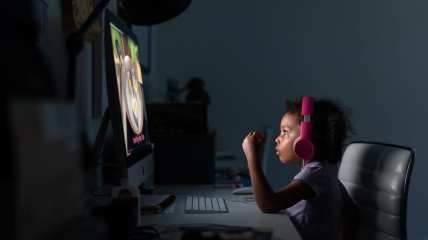For the contemporary new parent, baby rattles, and blocks have increasingly been replaced with tablets and smartphones. Although streaming an episode of “Gracie’s Corner” can be an ideal distraction for busy parents, a recent study found that screen time can be detrimental to a child’s development. According to a study reported by CNN, a one-year-old child experiencing one to four hours of daily screen time is at a higher risk of experiencing developmental delays in their communication, personal, problem-solving, social and fine motor skills by age two.
 Study finds that screen time can delay toddler development (Photo: Abobe Stock)
Study finds that screen time can delay toddler development (Photo: Abobe Stock)“One of the areas that’s relatively understudied in the whole screen time literature is looking at impacts of screen exposure on very young kids, especially when screens are introduced to babies,” said Dr. John Hutton, associate professor of general and community pediatrics at Cincinnati Children’s Hospital Medical Center, who wasn’t involved in the study, per CNN. “It’s definitely a global concern, and I think the findings (here) should apply to, really, other countries as well.”
The study of 7,097 children published in the journal JAMA Pediatrics assessed children’s daily screen time at age one, along with their performance in various developmental areas such as communication, fine motor skills, personal and social skills, and problem-solving at ages two and four. Both assessments were based on self-reported data provided by the children’s mothers. Children who engaged with screens for four or more hours daily were 4.78 times more susceptible to having underdeveloped communication skills, 1.74 times more prone to subpar fine motor skills, and twice as likely to exhibit underdeveloped personal and social skills by age two. By the time they turned four, the risk persisted only in the communication and problem-solving domains.
What makes screen time so harmful to children’s development?
According to Dr. Hutton, a child’s speech is developed when they are encouraged to speak and have opportunities to practice speaking. He emphasized that technology might detract from time spent building interpersonal relationships, which foster social skills since real people possess more dimensions than screen characters, and the brain learns through in-person interactions.
“They may hear a lot of words, but they’re not practicing saying a lot of words or having a lot of that back-and-forth interaction,” said Hutton. “The other question that’s always really important is, is the parent watching with the child? When a parent is watching with a child, that tends to mitigate a lot of the negatives.”
Hutton also pointed out that our brains activate when we observe people’s faces, facilitating our understanding of how to engage with people through interactions.
To curb developmental risks, experts recommend parents resort to good old-fashioned toys, coloring books, and reading books. Should the need to use screens arise, follow The American Academy of Pediatrics’ rule of quality over quantity of screen time. According to Hutton, doctors recommend long-form educational content, as short videos can affect a child’s attention span.
“One issue with some online children’s content is that parents will think it’s educational because it’s marketed as such and has lots of information about the alphabet, colors, numbers or animals their children can see and hear,” Hutton told CNN, explaining the real learning comes from content that goes beyond memorization.
Similarly, they recommend engaging the child in video chats with loved ones. That way, they can receive some form of social interaction while giving parents time to finish their tasks worry-free.
“We need to just slow down and … be as careful and mindful as we can about keeping kids anchored in the real world, which is really how we evolved as humans,” said Hutton. “There’s going to be plenty of time for screen time later once we get a better sense of who the kids are and what they need.”
TheGrio is FREE on your TV via Apple TV, Amazon Fire, Roku, and Android TV. TheGrio’s Black Podcast Network is free too. Download theGrio mobile apps today! Listen to ‘Writing Black‘ with Maiysha Kai.
.png)











 English (US) ·
English (US) ·